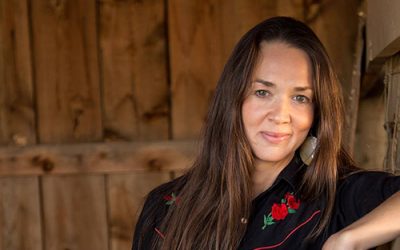THE GAY WEST: FROM DRUG STORE COWBOYS TO RODEO QUEENS
Talk Description: The masculine ideal represented by the American cowboy is variously interpreted by spectators, dancers, musicians, and contestants at gay rodeos and country western dances across the U.S. Examining embodied gender practices within these communities, this talk articulates the sonic, social, and geographical spaces of the gay American West.
 Biography: Kate Alexander received her Ph.D. in ethnomusicology from the University of California, Riverside in 2014. Her research focuses on intersections of whiteness, gender, and sexuality in North American music and dance communities, including Cape Breton’s traditional Scottish culture, and her current research on American LGBTQ country western dance and rodeo networks. Her work has been published in journals such as MUSICulturesand the Yearbook for Traditional Music. She is an Assistant Professor in the Honors College at the University of Arizona, where she teaches interdisciplinary courses on sound, music, visual art, and culture.
Biography: Kate Alexander received her Ph.D. in ethnomusicology from the University of California, Riverside in 2014. Her research focuses on intersections of whiteness, gender, and sexuality in North American music and dance communities, including Cape Breton’s traditional Scottish culture, and her current research on American LGBTQ country western dance and rodeo networks. Her work has been published in journals such as MUSICulturesand the Yearbook for Traditional Music. She is an Assistant Professor in the Honors College at the University of Arizona, where she teaches interdisciplinary courses on sound, music, visual art, and culture.
Dr. Kristina Jacobsen wins award for an article
Dr. Kristina Jacobsen wins award for an article The article ‘Don’t Even Talk to Me if You’re Kinya’áanii [Towering House]’: Adopted Clans, Kinship, and ‘Blood’ in Navajo Country” was awarded “the most thought-provoking article in Native American and Indigenous Studies...
Music, Emotion and Fish with Dr. David Bashwiner Part 2
Music, Emotion and Fish with Dr. David Bashwiner Part 2 We are back, with Part 2 of ‘Music, Emotion, and Fish’. If you haven’t had the chance to listen to Part 1, you can click back to Episode 15, Dr. David Bashwiner was just getting to his work on the Midshipman...
Dr. José Luis Hurtado awarded prestigious Guggenheim Fellowship
Composer and pianist José Luis Hurtado, an associate professor in The University of New Mexico’s Department of Music in the College of Fine Arts, is one of the 2020 winners of the prestigious Guggenheim Fellowship.



